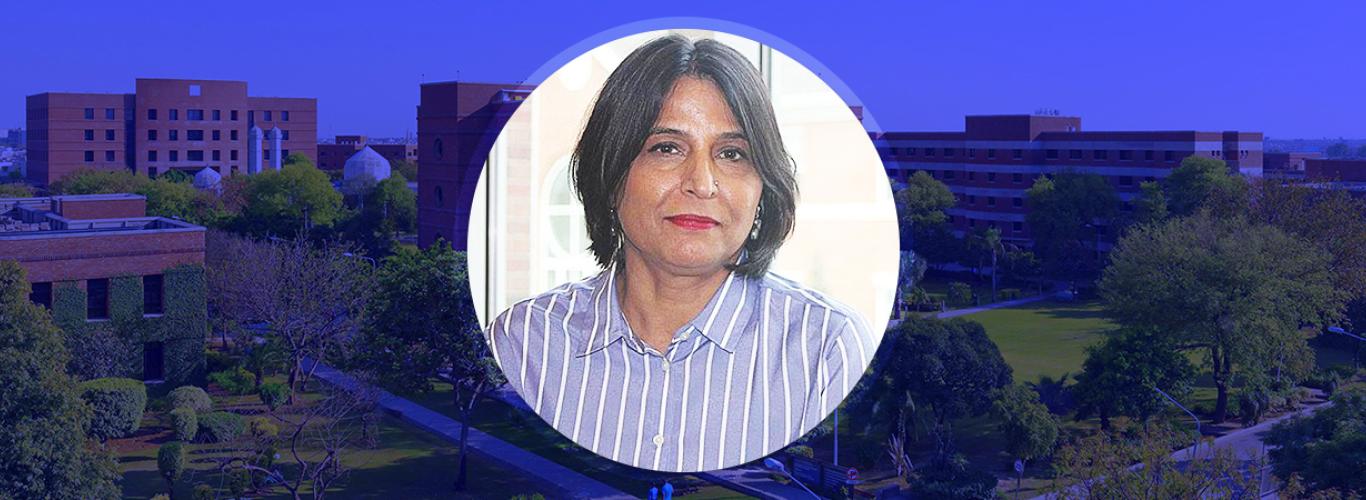LUMS Appoints Dr. Farhat Haq as Provost
In a landmark moment, Dr. Farhat Haq has recently been appointed as the University’s Provost. As the first female to hold this role at LUMS, Dr. Haq was selected after a rigorous international search process and a unanimous recommendation by the widely represented Search Committee. She has a PhD in Political Science from Cornell University, has served at Monmouth College in Illinois for more than 25 years as a Professor, and was previously also Chair of the Department of Political Science.
She first became aware of LUMS in 2002 when a colleague at Monmouth told her about an opening at the University for visiting faculty. She applied and got a prompt response. She then spent one academic year as a Visiting Professor at LUMS from 2002-2003. “I discovered this amazing hidden gem. I encountered very bright students who had so much hunger to engage in meaningful discussions. It was one of the most fortunate and enriching experiences in my personal and professional life,” she says.
In fact, she enjoyed herself so much that she was eager to return. At the time, her children were young and based in the USA and she couldn’t consider a permanent move. So, she decided to return for the summer semesters – and continued to do so for the next 10 years! It wasn’t easy, as her teaching schedule back home was quite intensive, and the summer season in Lahore is notoriously warm. But the draw of the students at LUMS and the community experience made the effort compelling and worthwhile. Over the years, she retained her connection with the University. Now, nearly 20 years later, her children are adults, and she is able to take up a full time role at LUMS as Provost.
In talking about the landscape at the University, Dr. Haq’s immense respect and appreciation for the work currently underway is clear. She remarks that even when comparing the University now to when she first visited, there has been a lot of positive changes. Student empowerment, in particular, is an area that she feels has improved tremendously.
In reference to her role as Provost, Dr. Haq notes that LUMS has evolved over the past 30 years and has grown from only offering a business programme to five distinct schools, along with establishing many centres and other initiatives. She explains, “The goal is to bring all the great work being done together in a way that lets the schools maintain their identity and autonomy, while moving forward as a university. One part of my role is to ensure that we are delivering the best education we possibly can. At the same time, it is important to coordinate all of the University’s initiatives in a way that the sum is greater than the parts.”
Dr. Haq’s vast and varied experience puts her in an ideal position to lead these efforts. Identifying first and foremost as a faculty member, she has a long history in the classroom to draw from. That connection with students gives her keen insight into issues about pedagogy and the students’ learning experience.
Her experience in faculty and professional development will also play a pivotal role. She is passionate about enhancing faculty careers, while also making sure they are effective in the classroom. She is excited about working with Deans to support faculty members and says, “The important things are already in place at LUMS. We will be working together to enhance their careers and help them be better researchers and teachers, while making sure we are not standing in their way.”
As the first female to hold this position at LUMS, she is keenly aware about representation and its importance. She draws the parallel that the countries around the world with the best response to COVID-19 have all had female leaders. “I don’t think it has necessarily anything to do with biology, but rather a style of leadership, consensus building and focusing on the task at hand. Women are used to having been caregivers all their lives, so they bring a certain sensibility to their professional life.”
She is also passionate about championing efforts that prepare students to become better citizens. She notes that academics are important, but the student experience should also entail offering them a more holistic education that includes character development. She suggests that this could be done through a mix of academic courses and experiential learning. Introducing a component in the core curriculum that requires students to be more reflective about who they are and who they want to be is one option. Another could be a mandatory civic engagement course for all undergraduate students where students could volunteer with a variety of vetted organisations.
When discussing the challenges that students are dealing with as a result of the global COVID-19 pandemic, Dr. Haq is empathetic. She advises them to remember that the circumstances are temporary, “It is a very hard situation, especially when you are young. But this too shall pass. You will come back to your beloved campus. For now, take full advantage of the online experience. Use this time for self-care and don’t get too hung up on grades. We are here for you, and we are thinking about you.”























